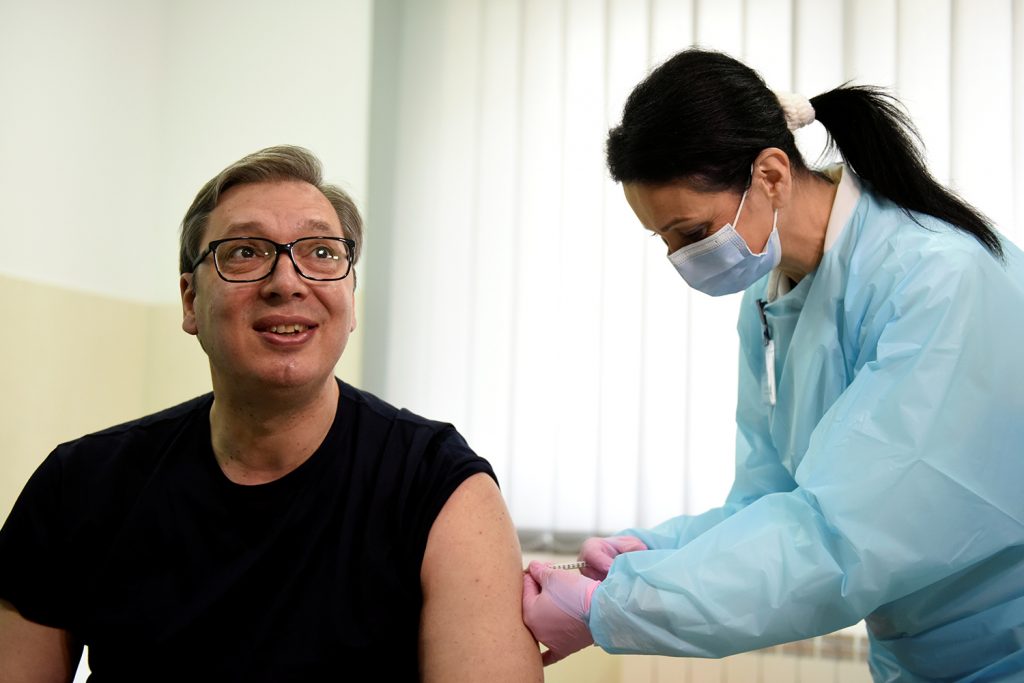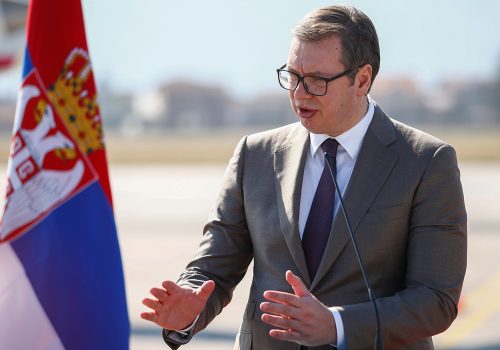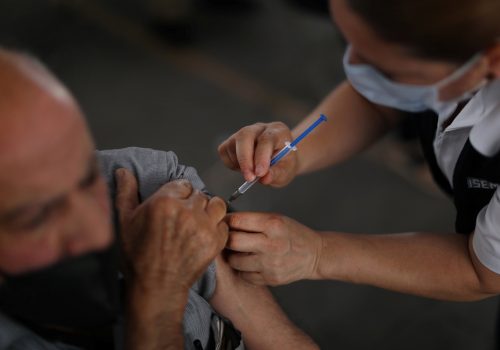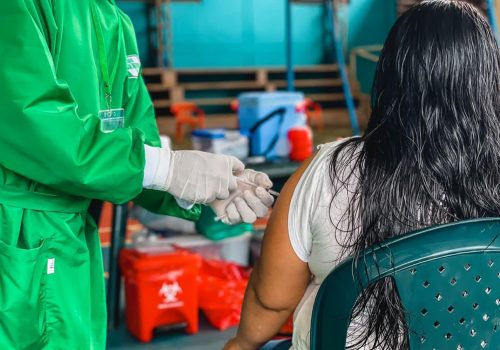Eleven days after COVID-19 was declared a global pandemic, TV audiences in Serbia were treated to an extraordinary sight. The country’s president, Aleksandar Vučić, kissed the Chinese national flag as medical equipment, personal protective equipment (PPE), and Chinese medical staff landed in Belgrade on March 22, 2020. Overnight, billboards sprang up across the Serbian capital featuring China’s president and the caption “Thank you, brother Xi.”
What appeared to be a prime example of Chinese COVID-19 diplomacy was built on thriving economic and diplomatic ties between Beijing and Belgrade, a true pillar within China’s 17+1 initiative in Central and Eastern Europe along with the Balkans. After the medical transport, China funded a network of laboratories to carry out coronavirus tests. In mid-January another plane delivered a batch of one million doses of China’s Sinopharm vaccine. Vučić turned up at the airport again to bask in the glory of the moment.
Half a year later, the narrative has changed. It is no longer about China boxing out the West in the Balkans but Serbia’s ability to punch above its weight. Serbian authorities have made impressive headway in inoculating their citizens—and using vaccines as a diplomatic tool:
- In a country with a population of just over seven million, 5.15 million doses have been administered. More than 2.4 million people—over one-third of Serbian citizens—have received two jabs.
- Serbia has donated vaccines to neighbors such as Montenegro, North Macedonia, and Bosnia and Herzegovina (to Republika Srpska, the Serb-majority entity).
- People from neighboring countries have been able to register and get jabs while visiting Serbia.
In short, Belgrade seized the momentum at a juncture when the World Health Organization-led COVAX cooperative program proved woefully slow to procure vaccines and European Union member states were busy taking care of their own citizens.
Arsenal of vaccines
China is part of Serbia’s success but not the full story. Sinopharm’s rollout, starting in January 2021, added to Belgrade’s arsenal of vaccines. Vučić got the Chinese jab in front of TV cameras in a remote village in eastern Serbia. The government floated plans for producing Sinopharm locally in partnership with the United Arab Emirates.
Serbia did not, however, put all its eggs in one basket. In fact, Serbia had already received its first Pfizer vaccine shipment in December 2020, and Prime Minister Ana Brnabić got the jab then—well ahead of most other European leaders. Russia’s Sputnik V vaccine arrived in January; later, in early June, the Belgrade-based Torlak Institute became the first facility outside the Russian Federation to produce it. Serbia’s AstraZeneca vaccine shipment arrived in February. Serbia took vaccines from all sources—China, Russia, and Western companies—and made the most of the stocks it accumulated.
This response to COVID-19 provides a second-to-none illustration of Serbian foreign policy. Vučić is not interested in siding with either China or the West, especially as the power competition between Beijing and Washington ratchets up. He believes Serbia’s interests, and his personal agenda, are best served by being open to business with everyone. The posture reflects Belgrade’s long-standing balancing act between the EU and the United States on the one hand, and Russia on the other. “Sit[ting] on two chairs” is how US diplomat Brian Hoyt Yee described Serbia in 2017.
The power of flexibility
In Serbia’s case, its vaccine diplomacy proves flexibility works. Serbia has fared much better in vaccinating its citizens than its pro-Western neighbors such as North Macedonia and Montenegro, both NATO members. Vučić has won plaudits across the region too.
Chances are he will do even more of these multivector acrobatics in the future, whether playing rival powers off each other or selling to the highest bidder. Eventually, Vučić will take full credit for the EU economic assistance earmarked for Serbia, while his loyal media will continue to sing Xi Jinping’s praises. Titoism has never gone out of fashion in this corner of Europe.
While China’s vaccine and PPE diplomacy scored some points in the Balkans, it is local players like Serbia’s Vučić who absolutely stole the show.
Dimitar Bechev is a nonresident senior fellow with the Atlantic Council’s Europe Center. Follow him on Twitter @DimitarBechev.
Further reading
Image: President of Serbia Aleksandar Vucic receives the Chinese Sinopharm vaccine against COVID-19 at a health station in Rudna Glava, Serbia, on April 6, 2021. Photo by Zorana Jevtic/Reuters.



